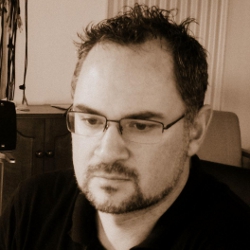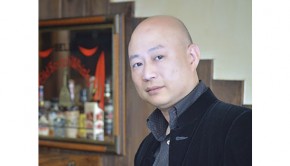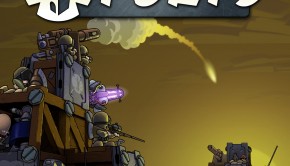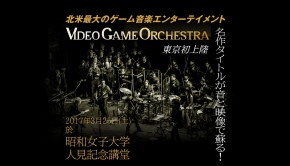Jeff van Dyck Profile
 |
Also Known As: N/A |
| Date of Birth: 1969 (Vancouver) |
|
| Residence: Brisbane |
|
| Game Works: NHL, Need For Speed, Total War, Alien: Isolation |
|
| Official Site: English Site |
History
| Organisation | Type | Tenure | Role |
| EA Canada | Game Developer | 1992 – 1997 | Sound Director, Composer, Sound Effects |
| The Creative Assembly Australia | Game Developer | 2003 – 2010 | Sound Director, Cinematics Director, Composer, Sound Effects |
| The Creative Assembly | Game Developer | 2010 – 2012 | Sound Director, Composer, Sound Effects |
Biography
Jeff van Dyck is a composer for games, films, and bands best known for his work on the Need For Speed, EA Sports, and Total War franchises. Born in Vancouver, Canada in 1969, the artist developed a passion for music and technology from a young age. He received piano lessons as a child and, though he wasn’t particularly interested in classical repertoire, he greatly enjoyed improvising his own pieces. His father Ralph Dyck worked as a studio musician at recording sessions and was also an influential electronics engineer at Roland Corporation, serving as the principal designer of the MC-8 Sequencer. As a result, he was surrounded by high-tech gear as a child and often went to studios to see the likes of Michael Jackson, Oscar Peterson, and Paul Horn record. The artist learned a lot through such experiences, going on to describe it as “education by osmosis”, and he realized that he wanted to be part of the industry. Facilitated by the connections he made at the studio, van Dyck went on to participate in numerous bands in the region, both as a songwriter and keyboardist. He particularly fondly remembers touring across Canada with Tony Papa and the Theory — playing to huge crowds at hockey stadiums — and making tight rhythmic performances with the Drop Dolls. However, he has stated that all the bands he participated in were important to him and helped to develop his musicality in one way or another. Having loved video games since the days of the Apple II, van Dyck started to consider becoming a composer after playing some NHL games on the Genesis and SNES; he thought he could do a better job with the audio and successfully applied to a job advertisement at EA Canada in 1992.
Van Dyck encountered a major learning curve during his initial years at EA Canada, due to both the creative and technical demands of video game scoring. In his debut project, van Dyck wrote the hard rock score for the acclaimed skating game Skitchin’. Despite his band background, the artist had produced very few rock tunes previously, but was eventually able to ignite his rock spirit and produce plenty of hard riffs. While he initially rendered the tracks with CD quality audio, he soon learned that he needed to downgrade them to the technologically limited Genesis and persisted to produce a soundtrack ahead of its time. While some aspects of this process were frustrating, van Dyck has stated this it was incredibly satisfying to achieve the final results. Thereafter he was assigned to write the music and sound effects for the first two FIFA titles for the Genesis. While producers initially requested an Americanised television sound reminiscent of The Sports Network, van Dyck decided to experiment with a European-influenced techno soundtrack instead and eventually won the praise of his superiors and fans alike. He was also responsible for developing the surprisingly realistic crowd chants on the title. In other early roles, van Dyck revamped the audio for FIFA International Soccer for its Sega CD adaptation, between taking charge of audio production of NBA Live ’95 on the Super Nintendo and the Coach K College Basketball on the Genesis. Also continuing to pursue band activities in his spare time, he formed the instrumental band The Heavy Lounge with guitarist Saki Kaskas and they indulgently produced a handful of progressive rock fusion pieces together.
Liberated from the technological limitations of his earlier works, van Dyck wrote streamed scores for two landmark EA scores. He developed an industrial rock score for NHL ’96 on PCs; in a unique collaboration, he produced the electronic backdrops for these tracks and he invited Saki Kaskas to double on guitars. Free from technical limitations, his previous studio experience no doubt helped him to achieve the desire production values. On 1995’s The Need For Speed, van Dyck was responsible for the majority of the techno tracks featured on the redbook soundtrack. Pieces such as “Odyssey”, “Chronos”, and “Aaeeyaeeyaa” gained international fame with their compelling rhythms, beautiful soundscapes, and extensive developments; one of these even featured vocal performances from Angela Somerville, a co-worker originally from Australia who went on to become his wife. He inevitably returned for the sequel, writing a range of electronic tracks both on his own and in collaboration with Saki Kaskas. In a further innovation, the soundtrack varied depending on the player’s position in the race; each track was arranged in three levels of intensity and transitions occurred at the end of a four or eight bar segment. The artist also returned to NHL 97, NHL 98, and NHL 99, where he built upon his earlier musical approaches with Kaskas. Promoted to sound director for these titles, van Dyck carefully considered how the music and sound effects would synchronise with each game while supervising a small sound team. Always a hands-on developer, he didn’t hesitate to tweak the game engine parameters to achieve the best results on these projects.
Despite being a well-respected composer at Electronic Arts, van Dyck had started to become tired of writing sports soundtracks and his wife also found the Vancouver weather unbearable. He emigrated with his wife to Queensland, Australia in 1997 to pursue a career as a freelance composer and soon carved a stable niche for himself. On behalf of Hasbro Interactive, he was responsible for the full spectrum of audio production for Missile Command and Battleship: Surface Thunder, and developed distinctive music and sound effects for each. He also supplemented the otherwise licensed soundtrack to Sled Storm with some heavy rock tracks. Despite wanting to escape sports games, he ironically found himself drawn back towards them when he was asked to handle a line of EA Sports games on behalf of The Creative Assembly, namely two cricket titles, two rugby titles, and AFL ’98. As an emerging freelancer, he did not want to turn down work and ended up writing a handful of menu themes and jingles for all these titles. While these projects brought few new experiences from the composer, it enabled him to develop a strong working relationship wtih the developer, who went on to produce the Total War series. van Dyck also continued to pursue band activities, forming Plastic Wooden Fruit with saxophonist Brett Evans and turntabler James Vincent. The band won a national competition run by youth radio station Triplej with the track “2 Bloody Sense”, a melange of electronic, jazz, and hip-hop elements, but ultimately never managed to get signed.
In 1999, Jeff van Dyck agreed to serve the sound director and composer of The Creative Assembly’s hit historical strategy game Shogun: Total War. While he initially penned some Hollywood-inspired fusions of Japanese instruments and modern orchestrations, he eventually decided to adopt a more authentic direction, capturing the mood of feudal Japan with dark, ethereal tracks featuring taiko drums and shakuhachi infusions. It was the first time he ever wrote music of that sort but it ended up being gloriously received by fans. The artist returned to offer some more elaborate pieces for the expansion pack Mongol Invasion, winning him an unexpected BAFTA award. Having impressed other developers with his work, he was thereafter asked to create a peaceful Asian-inspired score for Breakaway Games’ Emperor: Rise of the Middle Kingdom. Becoming the resident audio director of The Creative Assembly Australia (later renamed Sega Studios Australia) in 2003, he also inevitably returned to 2002’s Medieval: Total War and 2004’s Rome: Total War. For the former, he focused much more on orchestral and choral music than before given the time era, though was still keen to maintain his elegant and individualistic musicianship. On Rome: Total War, after researching a range of musical styles, he opted to hybridise his own musicality with the orchestral and choral influences of the Gladiator soundtrack. For the first time in the series, it received a full soundtrack release to enormous commendation and has even been sampled in historical documentaries for BBC2 and the History Channel. Despite focusing on period channels, he still received the opportunity to channel his passion for electronic music with the mellow sounds of Tiger Woods PGA Tour 2004 and the harder-edged Rugby 2004.
van Dyck also received the opportunity to work on some independent Australian films. His initial roles included Chris Nyst’s The Hat’s Last Roll, which followed the fate of a hitman following an assassination, and Luke Bradnam’s Luke’s Story, about a bored but fun-loving salesman who gambles on all his possessions. The artist found working on these titles a very different experience from video games, due to their linearity, but felt satisfied with the final results. He notes that film music “adds subtext, an intuitive layer, a gel that propels the feelings and personality of a scene”. Following these short films, van Dyck reunited with Nyst on the gangster comedy Crooked Business. While the title ultimately flopped, the composer still found it immensely satisfying to go to the cinema and see his name on the opening credits. Back in the realm of game scoring, van Dyck returned to 2005’s Spartan: Total Warrior and 2006’s Medieval II: Total War on behalf of The Creative Assembly. On the former, he experimented with fusing electronic and orchestral elements for the first time; while the score featured interesting ideas, van Dyck wishes he had more time and inspiration while working on it. As a result, he opted to share composing responsibilities on Medieval II: Total War and focus his time on producing setpieces that were even more elaborate and hybridised than before. He also sat out of the productions of Empire: Total War and Napoleon: Total War, and was replaced by Richard Beddow.
Following a break from the video games industry, van Dyck has returned to prominence in recent years. He took a central role on Stormrise. In addition to writing a creative electronically-oriented score, he also led the production of the cinematics for the first time. Thanks partly to van Dyck’s hard work, the game had high production values in the audio and visual departments. Yet by his own admission, it was also “undercooked” in the gameplay department and received largely negative reviews. He also handled the audio and cinematics of the DS’ Sonic Classic Collection and London 2012: The Official Videogame, which were the final titles released by Sega Studios Australia. In 2011, he made his long-awaited return to the Total War franchise with Total War: Shogun II. Throughout the soundtrack, he developed on the concept of the original game while offering a more lush, natural, and extensive sound. van Dyck recorded much of the score with live instrumentalists and also recorded a pop-flavoured ending theme with his wife. He produced an entirely new score for the expansion Fall of the Samurai, mixing melancholic traditional Japanese stylings with modern orchestration representing the dominance of the West. While controversially absent from Total War: Rome II, van Dyck has recently announced he is serving as audio director for The Creative Assembly’s horror title Alien: Isolation; in this project, he will pay homage to Jerry Goldsmith’s original score to recreate the tense horror feel of the original Alien. The artist has also recently worked on a Facebook title for Fixeye and the indie shooter Assault Android Cactus, between producing an emotional score for the crowd-sourced independent movie The Umbrella.
References:
– Various Game & Album Credits
– VGMdb Discography
– Official Site (English)
– LinkedIn Profile (English)
– Interview with Cyber Gamer (English, March 2011)
– Interview with Game Music Online (English, May 2011)
© Biography by Chris Greening (September 2008). Last updated on January 29, 2013. Do not republish without formal permission.
Posted on April 29, 2013 by Chris Greening. Last modified on March 21, 2014.














